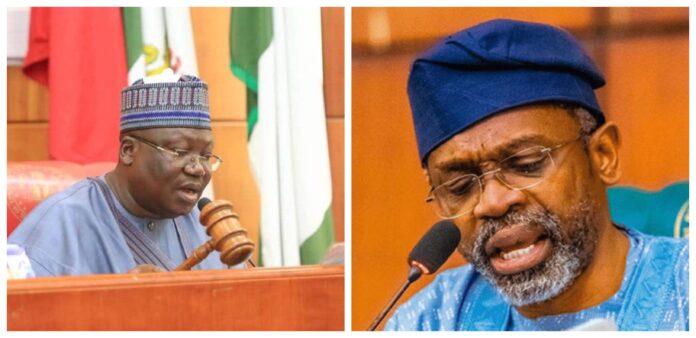El Bill says only co-contestants can contest candidates’ certificates
By Jeph Ajobaju, Chief Copy Editor
Lawmakers have sketched in the Electoral Act Amendment Bill a clause which says only someone who contested for the same post in the primaries of the same political party can contest in court the certificates and other credentials of the opponent.
This means:
- Someone in the All Progressives Alliance (APC) who did not contest in the primaries for the same office under the party cannot contest in court the credentials of the winner of the primaries, even if the credentials he submitted to the Independent National Electoral Commission (INEC) are fraudulent.
The same rule applies in the Peoples Democratic Party (PDP) in a case involving a member of the PDP.
- Someone in the PDP contesting for the same office with the winner of the primaries in the APC cannot go to court over the forged certificates and other documents of the candidate of the APC.
The same rule applies the other way round in the APC in a case involving a member of the PDP or any other political party.
- All other Nigerians, voters and non-voters, cannot sue to court and stop someone with forged documents from occupying a political post.
“A lot of them [lawmakers] have forged certificates and that is why they are doing it but it cannot help them.
“Even the Constitution says anyone who presents to INEC a forged certificate has committed an offence. So, they cannot help themselves,” said Femi Falana SAN.
Tinubu – a case study
The amendment also means that if Bola Tinubu – a member of the APC who is running for President – wins his party’s ticket, only his opponent or opponents in the APC primaries can take him to court over his certificates and other credentials.
In 1999, citizen Waliu Balogun wrote a petition to the INEC alleging that Tinubu did not attend the schools he claimed in filling out INEC Form 001 to contest for the Lagos governorship.
The News later investigated and published a comprehensive expose on Tinubu’s biographical and academic claims all of which the magazine alleged to be false.
Gani Fawehinmi SAN – the human rights lawyer, now late – took up the case and sued Tinubu to court to prove his credentials and also asked the court to compel the police to prosecute him.
Tinubu became Governor in May 1999 before the case could be decided in the lower courts. When it was finally adjudicated by the Supreme Court in May 2002, it ruled that he could not be prosecuted because he had immunity as a sitting Governor.
Tinubu escaped justice on technical grounds without disproving the allegations of falsification of his credentials.
Members of the PDP and other Nigerians are already waiting to sue him to court again over the certificate forgery allegations if he wins the APC ticket to show that Tinubu is, by law, not qualified for President.
But the proposed amendment in the Electoral Bill allows only those who participated in party primaries to challenge in court the school certificates, birth certificate, and other credentials of a co-contestant.
This places the responsibility on one single co-contestant or a few of them to challenge in court someone who does not possess credentials that qualify him or her for office.
In a corrupt Nigeria, however, someone who loses a party primary may decide on his or her own not to go to court, even if the opponent is by law not qualified for office; or the winner may bribe the loser not to sue, or silent the loser by other means.
__________________________________________________________________
Related articles:
Why Bola Tinubu must never be Nigeria’s president
Tinubu’s candidacy and pending discomforting questions
Tinubu’s presidency: Affliction must not rise a second time
__________________________________________________________________
Electoral Act (Section 31(5))
Section 31(5) of the current Electoral Act reads:
“Any person who has reasonable grounds to believe that any information given by a candidate in the affidavit or any document submitted by that candidate is false may file a suit at the Federal High Court, High Court of a State or the FCT (Federal Capital Territory) against such a person seeking a declaration that the information contained in the affidavit is false.”
The new amendment reads:
“Any aspirant who participated in the primaries of his political party who has reasonable grounds to believe that any information given by his political party’s candidate in the affidavit or any document submitted by that candidate in relation to his constitutional requirements to contest the election is false, may file a suit at the Federal High Court against that candidate seeking a declaration that the information contained in the affidavit is false.”
Court judgments
All Nigerians are currently allowed by law to challenge the credentials of candidates of any political party. This has been reaffirmed by several court judgments.
The Supreme Court in 2017 ruled that:
“From the provisions of Section 31(5) of the Electoral Act, 2010, as amended supra, it is not in doubt that it confers locus standi on ‘any person’ whether a member of a political party or not to invoke the jurisdiction of the High Court in accordance with the said provisions and the court has the requisite vires to hear and determine his case ….
“Section 31(5) of the Electoral Act, 2010, as amended, empowers any person with reasonable grounds to believe that any information given by a candidate is false to institute an action before any of the High Courts to seek a declaration that such information is false.”
The PDP and its Bayelsa governorship candidate Douye Diri filed a lawsuit in 2019 against APC governorship candidate David Lyo and his running mate Biobarakuma Degi-Eremienyo questioning the certificate of Degi-Eremienyo.
The Supreme Court agreed with the PDP and disqualified the APC despite the fact that the APC had already been declared winner of the election by the INEC.
The new amendment, if signed into law by President Muhammadu Buhari, makes this virtually impossible – even in a genuine case of document falsification.
Reactions from Nigerians
The reactions of lawyers and other rights activists to the proposed amendment are published below, as reported by The PUNCH.
Ebun-Olu Adegboruwa SAN (human rights lawyer)
“Such an amendment is antithetical to the Freedom of Information [FOI] Act and the spirit of transparency as the Supreme Court has several times guaranteed the rights of Nigerians to challenge the qualifications of candidates.
“I believe that the people seeking to occupy public office seek to occupy a position of trust and to that extent, once you have ventured into a contest for a position of public trust, your life is open and there is nothing to hide again.
“I think there are many Supreme Court judgments that have stated that it is not only those who are vying for a particular office that can question the credentials of a candidate.
“So, it is already settled in law that the locus to challenge the qualification of any candidate whether academic or otherwise is open to anybody who has reason to believe that a candidate has not told the truth.
“I think it is too late for the National Assembly [NASS] to masquerade those seeking office. That new provision will be challenged and I don’t think it can see the light of day.”
Femi Falana SAN (human rights lawyer)
“That provision will be illegal because anybody can demand from INEC under the FOI Act the form submitted by anybody and once you have that, you can go to court.
“That provision cannot remove my right to go to court. You can even report to the police or even prosecute the person by yourself. There is a provision for that in the Administration of Criminal Justice Act. This new amendment will not help them.
“A lot of them [law makers] have forged certificates and that is why they are doing it but it cannot help them. Even the Constitution says anyone who presents to INEC a forged certificate has committed an offence. So, they cannot help themselves.”
Oluwole Osaze-Uzzi (former INEC Director for Voter Education and Publicity)
“As the law stands, if any candidate fills Form CF 004 for his personal particulars, anybody can go to court, file a case and say such a person is not qualified.
“In the new amendment, they have limited to only those who contested the primaries with that person is qualified.
“But it allows the wrong people to scale through and become elected officers. These are issues that we need to look at. This is one of the ugly aspects of the bill.”
Ariyo- Dare Atoye (Convener, Coalition in Defence of Nigerian Democracy and Constitution)
“If there’s a provision in the Electoral Act that says that voters cannot sue, that is provision is unconstitutional.
“However, such a section should not be a source of worry for Nigerians because it is always the responsibility of the political parties to field aspirants and candidates, the public has the responsibility to vote or not to vote an aspirant they think they have concern about.
“If a party has run the risk of fielding a candidate with unqualified credentials it should suffer from such an abnormality either from within or by a challenging party.”
Faith Nwadishi (Director, Center for Transparency Advocacy)
“The process already is cumbersome and the judiciary is already messing up the entire process. These are mainly pre-election matters and if they are not dispensed off quickly, let it be the responsibility of those who are contesting that election.
“In fact, the politicians have become too lazy in our electoral process, they are the ones who should do the most work, they are the biggest beneficiary. What I think the bill would do is to give more responsibility of scrutiny to the contestants.
“As it is now, citizens can draw the attention of whoever is contesting and let whoever is interested to take the matter to court, they should also ensure a thorough check on those contesting so that at the end of the day their votes would not be wasted like in Bayelsa.”
Obidike Okolo (National Treasurer, Inter-Party Advisory Council)
“That provision, if passed, is not democratic because it does not connote democracy.
“If a person presents a certificate, anybody who is a Nigerian should be able to challenge such information given because the person who is presenting such information or certificate is not going to serve just those who contested primaries with him.
“He is going to serve the generality of Nigerians, especially even more when the person is giving such information under oath.
“So, it is like perjury and at the end of the day if you give false information and if you commit perjury, it’s crime against the state.
“The state is a representative of the people and it is actually a crime against the Nigerian people. So, why shouldn’t Nigerians be entitled to challenge any information if they feel somebody has given false information?
“We do not support that kind of law and that aspect should be expunged; that’s our opinion.”














